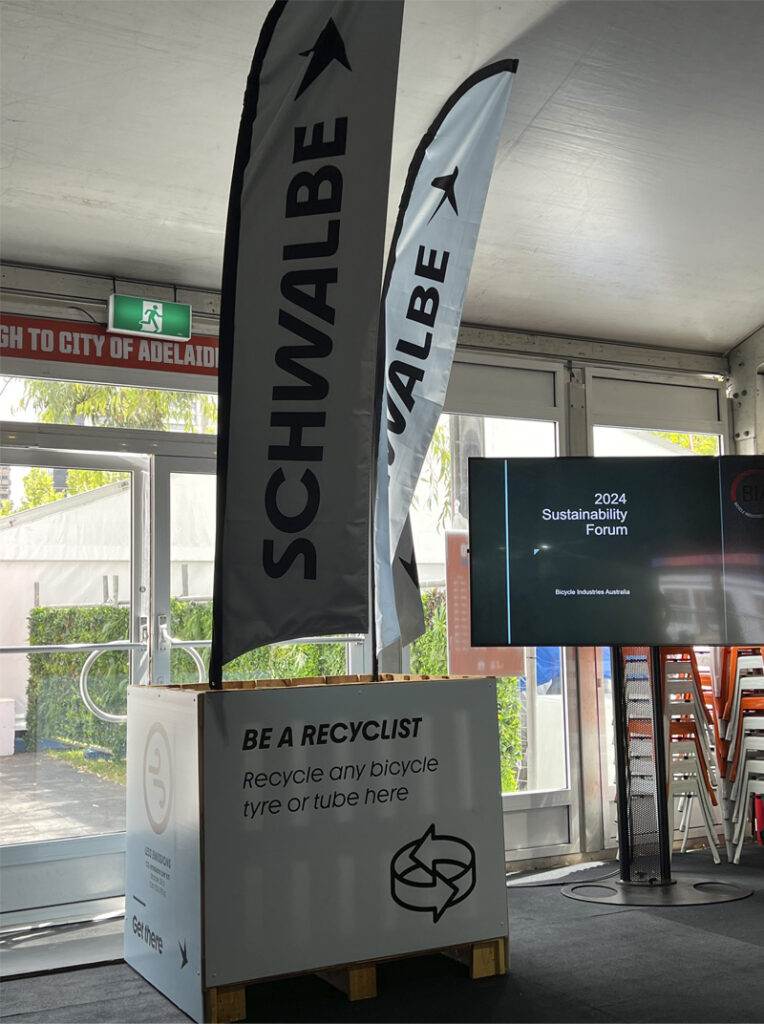Should We Make Our Industry More Sustainable?

Adelaide, SA
In terms of their environmental impact, bicycles are already far more sustainable than other means of transport so should we bother to try to further lower the footprint of our industry?
Some members already think so and attended the first annual Sustainability Forum run by Bicycle Industries Australia (BIA) on Wednesday 17th January during the Tour Down Under.
Last year BIA established an ongoing Sustainability Committee which has set three strategies that it recommends all industry members adopt wherever they are applicable to their unique business. These are:
- Improve end of life uses of equipment (recycling, reuse etc).
- Reduce the amount of non-recyclable material used both in bicycles, P&A and in their packaging and any related materials.
- Improve the quality and durability of bikes so that they have a longer functioning lifespan.
Four presenters spoke at the forum, followed by a lively Q&A and discussion session.
UCI Sets Global Agenda
Tony Mitchell presented first. Tony, who is based in Auckland, New Zealand has a corporate career outside the bike industry, but is also a senior official at the UCI (the International Cycling Union which governs world competitive cycling).
He is the President of the Oceania division of the UCI and of the Equipment and Innovation Committee, but most relevant to the forum, is President of the UCI Sustainability Commission.
He said that the UCI has about 120 staff and a turnover of about A$100 million. It aims to be carbon neutral by 2030. The UCI only owns and promotes a few events itself, most notably their annual World Championships across the various cycling disciplines such as Road, Track, MTB, BMX etc.
But it oversees a much larger ecosystem of World Tour teams and smaller teams, race promoters, host broadcasters, a global network of national cycling federations of which AusCycling is our Australian example and has input into the Olympics and other broader events.
Therefore the UCI is in a position to have influence far beyond its own direct activities.
It has adopted a Climate Action Charter and invited members the above groups to sign on.
So far, Tony said they have 101 signatories including 29 teams, 51 event organisers and 32 national federations.
At this stage, that’s a voluntary decision but could become a condition of interaction with the UCI in future.
The eight charter points are:
- Measure our climate footprint and report on it.
- Promote active travel and the role of the bicycle.
- Ensure the effects of climate change are factored into our future plans & decision making.
- Implementation of sustainable procurement for events and operations.
- Reduce energy demand and priorities renewable resources.
- Reduce waste.
- Prioritise low carbon transport.
- Respect nature and raise awareness for conservation.
Tony gave details and examples related to each of these points.
The UCI have developed a sustainability impact tracker which anyone can use free of charge. You can download it from here.
Trek Gives Manufacturer’s Perspective
Next, Mark Eadle spoke about Trek’s sustainability journey so far.
Mark is the Asia Pacific Advocacy and Engagement Manager for Trek, whose global head office hired an outside consultancy to do a full baseline environmental audit of every aspect of their company in 2020.
This resulted in their first Sustainability Report being published in 2021.
All aspects were reviewed, re-measured and a second report was published in August 2023. You can download the latest report from here.
As part of this overall process, Trek have also revised their packaging processes and materials. We previously wrote about this here.
Trek are focusing one 10 areas to reduce their carbon footprint.
- Shift cycling mode share (ie a greater proportion of all trips being done by bicycle as opposed to other means such as cars)
- Increase access to bike share.
- Remove plastic waste from packaging. (Mark noted that they’re replacing zip ties with string in some cases)
- Establish and protect new trails.
- Create zero landfill manufacturing facilities.
- Increase reliance on alternative materials.
- Reduce corporate travel.
- Increase reliance on renewable energy.
- Consolidate shipments to retailers.
- Reduce use of air freight.

Recycling Tyres
Next Lisa Howard from Bike Box, who is the exclusive Australian agent for Schwalbe bicycle tyres and Jil Tomaschko who was visiting from Germany and is Schwalbe’s Marketing Manager Road / Gravel.
They talked about the problems of recycling tyres in terms of transport and logistics. As a case in point, they had on display a Schwalbe branded used tyre collection bin that was on site at the expo during the Tour Down Under but was being used by some visitors as a regular rubbish bin.
Jil said that for some models Schwalbe had now closed the circle, but being able to recover and re-use carbon black in new tyres such as their Green Marathon model.
What Can Dealers Do?
Finally, Jessie Alice who is running the Green Wheels program at Revolve Recycling spoke about her visits and audits of 65 bicycle stores across NSW. She reported that more than 80% of them are not participating in any recycling programs.
During the Q&A session Tony Mitchell predicted that, “Whoever gets in early will do well. Change makers are wealth creators. There will be more measuring—organisations won’t be able to hide in the future.”
Convenor Peter Bourke from BIA closed the forum by summarising, “This is an opportunity for the bike sector to have a positive impact.”
